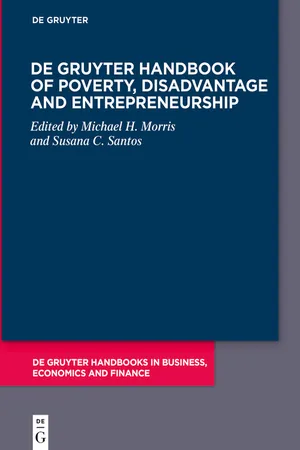
De Gruyter Handbook of Poverty, Disadvantage and Entrepreneurship
- 741 pages
- English
- PDF
- Available on iOS & Android
De Gruyter Handbook of Poverty, Disadvantage and Entrepreneurship
About this book
Is entrepreneurship a pathway out of poverty? Does creating a business represent a means for improving one's life circumstances? Surprisingly little is known about ventures started by those in circumstances of poverty. This pioneering handbook integrates diverse perspectives from around the world regarding the poverty and entrepreneurship interface.
While the tendency among many scholars, economic developers, and policymakers is to downplay these ventures, arguing they are largely inefficient, marginal enterprises that create little innovation and few jobs, the chapters in this handbook demonstrate their significant contributions, and encourage societies to invest in their development.
The authors explore a range of factors affecting the ability of the poor to create enterprises that contribute to their well-being, including the role played by personal capabilities, education, family support and faith, availability of microfinance, technology, supportive community ecosystems and a munificent institutional environment. By shedding light on issues that can help nations realize the potential of these ventures, this volume demonstrates how entrepreneurship can serve as a source of empowerment, while providing direction regarding ways to surmount the obstacles that stand in the way.
Frequently asked questions
- Essential is ideal for learners and professionals who enjoy exploring a wide range of subjects. Access the Essential Library with 800,000+ trusted titles and best-sellers across business, personal growth, and the humanities. Includes unlimited reading time and Standard Read Aloud voice.
- Complete: Perfect for advanced learners and researchers needing full, unrestricted access. Unlock 1.4M+ books across hundreds of subjects, including academic and specialized titles. The Complete Plan also includes advanced features like Premium Read Aloud and Research Assistant.
Please note we cannot support devices running on iOS 13 and Android 7 or earlier. Learn more about using the app.
Information
Table of contents
- De Gruyter Handbooks in Business, Economics and Finance
- Contents
- List of Contributors
- Preface
- Part 1: Understanding the Poverty and Entrepreneurship Interface
- 1 Toward a New Paradigm for Poverty Entrepreneurship
- 2 The Challenges of Poverty When Starting a Business
- 3 Opportunity Recognition Through the Lens of Poverty
- 4 Theoretical Frameworks for Research on Poverty and Entrepreneurship: A Review and Agenda for Future Research
- Part 2: Contextual Variables Affecting Poverty and Entrepreneurship
- 5 The Informal Economy and Poverty in Developing and Emerging Economies: Outlining a Process of Semi-formalization to Support Development
- 6 Understanding Entrepreneurship and the Informal Sector
- 7 Business Formalization, Government Program Participation, and Civic Engagement: Evidence from West Java, Indonesia
- 8 Entrepreneurship and Poverty: A Comparative Institutional Perspective
- 9 Ecosystems and the Poverty Entrepreneur
- 10 It Takes a Village: Towards Entrepreneurial Ecosystems Dedicated to the Poor
- 11 Child Entrepreneurs in Bangladesh: The Role of the Poor Family in Initiating Businesses
- 12 From Surviving to Thriving: The Multiplier Effect of Women’s Entrepreneurship in Emerging Markets
- 13 The Impact of Poverty, Disadvantages, and Entrepreneurship Among Refugee Women Entrepreneurs in Glasgow- Scotland
- 14 Beyond the Narrative: Exploring the Myths of Race, Poverty, and Entrepreneurship
- Part 3: Mechanisms to Facilitate Sustainable Entrepreneurship
- 15 The Psychology of Poverty-Based Entrepreneurs: Faith-Community Involvement, Status Hierarchies, and Venture Flourishing
- 16 Faith and Entrepreneurial Decision- Making: Case Experiences with People in Poverty Circumstances
- 17 Poor Entrepreneurs’ Strategies to Overcome Resource Constraints
- 18 Entrepreneurial Hustle and the Poverty Entrepreneur: Uncovering Alternative Means to Achieve Success
- 19 Microfinance for Poverty Entrepreneurs: Addressing Gender-Based Violence for Business Success
- 20 Alternative Funding Mechanisms for Low-Income Entrepreneurs in Sub-Saharan Africa
- 21 Microfranchising and the Poor
- 22 Patterns, Process, and Socioeconomic Impacts of Smallholders’ Agro-machinery- Based Entrepreneurship in Bangladesh
- 23 Marketing Practices and the Entrepreneurial Success of Women in Côte d’Ivoire: The Role of Cultural Systems
- 24 The Cooperative Enterprise and Poverty Reduction in Africa
- 25 Approaches to Mentoring When Supporting Poverty Entrepreneurs
- Part 4: Priorities for Advancing the Poverty and Entrepreneurship Interface
- 26 Critical Perspectives on Research Priorities at the Poverty and Entrepreneurship Interface
- 27 Fostering Poverty Entrepreneurship: A Review of Key Policy Needs and Approaches in the United States
- 28 Overcoming Adversity: Priorities of Disadvantaged Entrepreneurs Participating in a Holistic Community Intervention Program
- 29 Priorities When Attempting to Scale a Poverty Intervention Program
- List of Figures
- List of Tables
- About the Editors
- Index